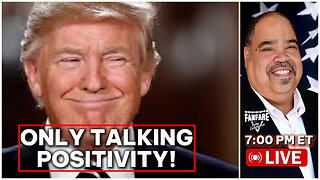Premium Only Content

Does Religion Do More Harm Than Good? 4 Pros and Cons
Is religion harmful? A recent survey showed that many people, even religious people, will say, “Yes.” But they mean the other guy’s religion, not their own.
I believe that in the 21st century, all religions that include the supernatural as part of their belief system are harmful.
I am not saying that religion does not have any good points, but on balance, religion does more harm than good. Sometimes the very things that are good about religion are the things that make it harmful. This article examines four pros and cons of religion.
Religion fosters group identity but also creates divisiveness.
Religion explains the world but also subverts critical thinking.
Religion provides comfort but also creates dependency.
Religion does good work but also diverts resources.
What Is the Origin of Religion?
Religion goes so far back in human history that it is probably safe to say that religion has always existed.
The first cavemen lived in a terrifying world. The only way to make sense of their life was to invent gods and spirits that controlled the world. The next logical step was to try to influence these gods and spirits. And that was the beginning of religion.
People lived in tribes, and each tribe had its own gods. With the advent of agriculture, the tribes coalesced into towns, cities, and states. Sometimes the gods of the various tribes ruled jointly; sometimes, one god would supersede all the others.
Tribal people wanted a fierce god who could protect them in conflicts with other tribes. It was a case of “My god can beat up your god.” This explains the war-like attributes of the god of the Old Testament of the Bible.
A group that had a belief in God had a survival advantage in primitive times. Many of the things that religion provides were beneficial when civilization was less advanced; today, however, they do more harm than good.
Religion creates divisiveness
Religion creates divisiveness
Canva.com
1. Religion Fosters Group Identity but Also Creates Divisiveness
Tribal gods gave a group of people an identity. This made the group cohesive. We are the children of (NAME OF GOD.) This group unity undoubtedly helped early mankind to survive.
The harm of this is divisiveness. We are the insiders; they are the outsiders. They are different; they are the other. We have to kill them, or at the very least, conquer, convert, or enslave them.
As the human population grew, it was not tribe against tribe, but country against country and religion against religion. As technology advanced, the weapons were not spears and stones, but machine guns and nuclear bombs. Religious zealots now have the tools to threaten all humanity with extinction.
How many wars have been fought because of religion? How many billions have died because of religion? One religious group kills people of another religious group. One group within the same religion tries to kill another group within their own religion, e.g., Catholics vs. Protestants, Shia vs. Sunni.
How many have died because of religion—the Crusades, the Inquisition, the Holocaust, the witch burnings, etc?
Yes, the wars and mass murder were often done for reasons of political power, but it was religion that made it possible. Religious institutions did not condemn the wars; just the opposite, religious institutions were usually actively supporting the wars and genocides. During WWII, the Pope could have said, “It is a mortal sin to participate in the extermination of the Jews.” How many lives would have been saved?
Even today, groups like Al Qaeda and ISIS war as much against other factions within the Muslim world as they do against the West. Many say that ISIS is just a power struggle for control of the Mid-East. Perhaps, but the people who follow the ISIS leaders do so in the name of their religion.
There is a clear inverse correlation between the level of religious belief in a country and the peacefulness and prosperity of that country.
Religion subverts critical thinking
Canva.com
2. Religion Explains the World but Also Subverts Critical Thinking
When there was little or no science to explain the world, religion provided the explanations. Knowing that there was a reason behind the good and bad fortune of life gave a feeling of control. If early humans did not feel that they had control, they might have given up when faced with adversity.
The harm from this is the subversion of critical thinking. People become used to accepting superstition instead of science, magic instead of reason. This type of thinking makes people vulnerable to all types of charlatans.
I once had a conversation with a man, a lapsed Catholic, who nonetheless was bringing up his children in the Catholic Church. He said this religious upbringing would keep them from later joining a cult. I was bringing my child up as an atheist for the same reason. I told him, “You have taught your children to believe in superstition, so perhaps they will later decide to change from one superstition to another. I have taught my child to reason, so he will be skeptical of any cult that tries to recruit him.
When the Catholic Church emerged from the Dark Ages, it began to encourage science. It was seen as a way to understand God’s Creation. Unfortunately, science kept discovering things that were in opposition to the teachings of the Church. The church then tried to quash science. Scientists like Galileo and Bruno Giordano were tried for heresy. The battle continues, but science, because it is based on provable truth, is winning.
Sam Harris is a well-known atheist who has written several books. He opposes religious tolerance. He argues that religion is a continuum. If we support the so-called moderate religions, we are also giving credence to the more violent and bizarre religions. He believes that all religions that advance supernatural explanations for the world must be abandoned.
Heaven's Gate Is an Example of the Power of Religion to Harm
In 1997, a cult in California known as Heaven’s Gate was in the news. This cult incorporated Christian ideas about the apocalypse and mixed them with ideas from science fiction. Thirty-eight adherents committed mass suicide in order to gain salvation by leaving their terrestrial bodies so they could be “beamed up” to a UFO following in the path of the Hale-Bopp comet. I remember how shocked everyone was when this story broke—How could anyone have believed this crazy stuff that the cult leader was preaching?
I did not find the ideas of Heaven’s Gate to be any less crazy than the ideas of traditional religions. The main difference is that most modern religions, most of the time, are life-affirming. They help people get through life; they don’t want them to end their lives. However, once people have learned to accept things on faith without evidence, people can end up believing anything.
One man’s faith is another man’s heresy is another man’s crazy.
Religion creates dependency
Canva.com
3. Religion Provides Comfort but Also Creates Dependency
Life is hard. Bad things happen to good people; good things happen to bad people. Bad people do bad things and get away with it. Natural disasters strike, killing hundreds and sometimes thousands. As the joke goes: Life’s a beach, and then you die.
Religion, and a belief in the afterlife, give many people comfort. It gives them a feeling of purpose and meaning; it gives them solace in times of grief.
The harm from this is a childlike dependency. Your religion tells you what is right and wrong, just as your parents did when you were a child.
Have you heard people say, “It is all in God’s hands” or “It is God’s will”? Yes, others say, “God helps those who help themselves,” but I think too many would rather pray than take action to better their situation. Religion becomes an excuse for complacency and laziness. If you have diabetes, prayer and resignation will not help you, but a change in diet and more exercise might.
There are politicians in the United States that refuse to do anything about man-made global warming because they believe that it is in God’s hands. They think the sea level will not rise because, in the Noah’s Ark story, God promised no more floods. (I believe the Bible also says something about the fire next time. Fire? Global warming? Hmmm?)
One big issue is marriage equality and homosexuality, which many religions call sin. Some of the more enlightened say, “Hate the sin, but love the sinner.” It sounds good, but when the “sin” is who the person is, the “sin” and the “sinner” cannot be separated.
I remember being shocked one day when I thought deeply about what it meant to be a “sinner” and to have been born a “sinner.” How absolutely horrible it must feel to self-identify as a sinner. I have made mistakes and not always lived up to my ideals, but I never thought of myself as a sinner. The mistake is not who I am; it is just something I did. I feel guilt for the wrongdoing, I take responsibility for it, and I resolve to do better. I do not go to a priest to be absolved or to a minister to be saved.
Religions call all kinds of natural and normal feelings and behaviors sin, especially when it comes to sex. Some tell you what you can and cannot eat; some tell you what you can and cannot wear, some tell you what you can and cannot do with your body, and what you can and cannot do on certain days of the week. Deviate from any of these prescriptions and proscriptions, and it is a sin. Does God really care about circumcision and clitoral cutting, about shaved heads and beards, about turbans and headscarves, about pork and shellfish?
Religion diverts resources
Canva.com
4. Religion Does Good Work but Also Diverts Resources
Religious groups often do a lot of good work, and I commend them for it. They help the poor with food banks and homeless shelters; they assist in natural disasters; they run hospitals, adoption agencies, and schools.
Secular groups do all of these things too, and they do it more efficiently because far less of their resources are spent on “overhead,” and no resources are spent on saving souls. Also, religious organizations are often choosy about who and how they help. You can come to their soup kitchen, but you will have to stay for the sermon. Missionaries go to poor countries and build a well or a school, but they will also build a church. A church will help you adopt a child, but not if you practice a different (or no) religion and not if you are part of a same-sex couple.
Religions are just like for-profit corporations—to survive and grow, a religion must build power and wealth and compete for market share. Is that why some religions forbid family planning or abortion—they want to increase their numbers at the expense of the well-being of the women and families who might be better off with fewer children? Is that why poor people are made to tithe and donate when that money could be better spent on their families?
I have always thought about how convenient it is that many churches say you cannot be saved by good works. It seems you have to join their church to be saved.
Some have said the subjugation of people is actually part of religion’s marketing plan. Research has shown that when people feel prosperous and secure, the hold of religion weakens. Not one advanced democracy with progressive socio-economic programs that provide for the well-being of its citizens has a high level of religiosity.
Does No Religion Mean You Can Do Anything?
Lack of religion is not a license to rape and pillage and do whatever you want. We have laws and we have codes of conduct. People are “moral” because “virtue is its own reward.” We are happier and more successful in life when we follow the Golden Rule and behave ethically with kindness and compassion. That is why the moral principles of most religions and the secular philosophies of life have very similar core principles.
Besides, is anyone who is motivated by the promise of heaven or the fear of Hell really a moral person? I say if you are not good for goodness’ sake, you cannot call yourself a moral person.
Sources and Further Reading
Dr. Phil Zuckerman, Professor of Sociology at Pitzer College, has written several books about the relationship of religion and positive societal characteristics:
Living the Secular Life: New Answers to Old Questions
Society Without God; What the Least Religious Nations Can Tell Us About Contentment
This content reflects the personal opinions of the author. It is accurate and true to the best of the author’s knowledge and should not be substituted for impartial fact or advice in legal, political, or personal matters.
Questions & Answers
Question: How harmful is religion?
Answer: I think religion has both good and bad effects, as I explained in the article. Overall, I think the bad outweighs the good.
© 2015 Catherine Giordano
BY CATHERINE GIORDANO
Follow talksallabout
JOIN THE CONVERSATION
Recommended Articles
Why Atheism Specifically Targets Christianity More Than Other Religions
Pros and Cons of Religion
What Is Donald Trump's Religion?
Atheist Churches: What Role Does Religion Play in Society?
Unitarian Presidents: The Architects of American Democracy
Political Parties and Symbols: Origins and Meanings
Privacy Policy
About Us
Editorial Policy
Terms of Use
© 2023 The Arena Media Brands, LLC and respective content providers on this website. HubPages® is a registered trademark of The Arena Platform, Inc. Other product and company names shown may be trademarks of their respective owners. The Arena Media Brands, LLC and respective content providers to this website may receive compensation for some links to products and services on this website.
-
 54:25
54:25
Inverted World Live
4 hours agoThe JFK Assassination and How the CIA Made the Zapruder Film | Ep. 70
19.3K11 -
 10:11:25
10:11:25
SpartakusLIVE
11 hours ago$18,000 2v2 WZ Total Frenzy Tournament || #1 Comp Champ is BACK
71.1K4 -
 8:11
8:11
MattMorseTV
1 day ago $15.29 earnedMacron just SURRENDERED.
61.8K80 -
 1:35:03
1:35:03
Glenn Greenwald
7 hours agoTrump DOJ: There's Nothing to the Epstein Story; State Dept: Syria's Al-Qaeda are No Longer "Terrorists;" Trump & Lula Exchange Barbs Over Brazil | SYSTEM UPDATE #482
134K121 -
 2:18:39
2:18:39
We Like Shooting
17 hours ago $2.01 earnedWe Like Shooting 618 (Gun Podcast)
24.5K -
 2:42:17
2:42:17
Barry Cunningham
6 hours agoHERE'S WHY SOME IN MAGA ARE SO NEGATIVE ABOUT PRESIDENT TRUMP?
60.8K34 -
 1:54:30
1:54:30
Joker Effect
4 hours agoWhy Gaming Streamers Aren't Successful and How To Fix It. Tim The Tatman was RIGHT... Kinda
27.4K2 -
 3:43:25
3:43:25
megimu32
4 hours agoOTS: From Ozzy to Emo 🎸 The Rise & Fall of the Rockstar
18.3K2 -
 1:22:50
1:22:50
Adam Does Movies
8 hours ago $0.89 earnedMovie News Live Taping! + AMA - LIVE!
19.2K -
 1:47:11
1:47:11
EnDuEnDo
3 hours ago🚨Variety Stream 🎮 Push to 600 Followers 🚀 Chill Vibes 😎 Content Creator for @SelfMadeGGs & @SMKAcademy
11.8K1